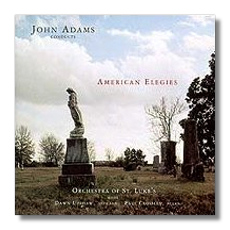
The Internet's Premier Classical Music Source
Related Links
-
Adams Reviews
Diamond Reviews
Feldman Reviews
Ives Reviews
Marshall Reviews - Latest Reviews
- More Reviews
-
By Composer
-
Collections
DVD & Blu-ray
Books
Concert Reviews
Articles/Interviews
Software
Audio
Search Amazon
Recommended Links
Site News
 CD Review
CD Review
American Élégies

- Charles Ives:
- The Unanswered Question (late version)
- 5 Songs (orch. by John Adams)
- Ingram Marshall: Fog Tropes
- Morton Feldman: Madame Press Died Last Week at Ninety
- John Adams: Eros Piano
- David Diamond: Elegy in Memory of Maurice Ravel
Dawn Upshaw, soprano
Paul Crossley, piano
Orchestra of St. Luke's/John Adams
Nonesuch 79249-2
Called "American Élégies," the album contains music mainly of a quiet, reflective nature. You might expect a long evening, but somehow the program flies. The Unanswered Question, of course, is a classic, recorded many times. Adams does fine, without really grabbing you like Bernstein, Thomas, or Dohnányi. The angry wind parts are the best things here. The strings, however, come across as unremarkable, rather than rapt. The songs fare better. Upshaw, apparently Nonesuch's house soprano, sings better than I've ever heard her. Usually, her performances remind me of a dutiful student's, with no more than a Cliff's Notes understanding of her texts. She has struck me as having no real experience in the world - a negative ignorance, rather than a positive innocence. Here, however, she manages innocence, especially in "Serenity." Yet her diction remains a sore point, with an apparent inability to handle the short "i" sound; "in" becomes "een," "is" becomes "eez." Also, she sticks in h's where they don't belong, so that "I" often becomes "high," particularly at points where she's trying to goose the emotional level. I know that nit-picking like this often puts people to sleep, but in this case, it matters. Upshaw's diction comes off as affectation and consequently distances the listener. I trained as a singer, and I swear this is a bad habit or the result of bad teaching. Bad mechanics – or better, the reliance on the same mechanical trick - calls her dramatic sincerity into question.
Ingram Marshall's Fog Tropes uses the sounds of fog horns as its primary material. As in such works as Hovhaness' And God Created Great Whales, "environmental" sounds on tape are made to blend with live instruments, so that the boundary between the two becomes blurred. The piece defies conventional analysis. I've heard it over many weeks, and each time my apprehension of it has differed, very much like looking at a landscape under different light. I've decided this is a feature, not a bug.
Feldman actually intended Madame Press as an elegy for his piano teacher, Maurina Press. I must say that the charm of Feldman's music usually escapes me, but this is a highly poetic four minutes. A cuckoo clock continually strikes over a slowly shifting texture of block chords, to evoke an innocent, almost Mahlerian vision of eternity.
Adams's Eros Piano eulogizes both Feldman and, in "foresightful hindsight," Takemitsu. Like all of Adams's music, it is well-planned and beautifully orchestrated. Unfortunately, for me it lives only in fits and starts, particularly in its bluesy passages, curiously reminiscent of Franz Waxman's lush opening titles to the movie A Place in the Sun. Crossley, a pianist who came out with wonderful recordings of Tippett and Debussy, doesn't have nearly enough interesting work here.
The Diamond Elegy, written within days of Ravel's death, exists in two versions: the original for brass and percussion, and the strings-and-percussion account recorded here. It's not typically elegaic, which means that it avoids the chicken-soup and drooping-lilly cliches of the genre. It also doesn't strive for the lush harmonies and textures of Ravel. In fact, for most of its length, it sounds austere, almost enraged at loss. The idiom is neo-classic 30s modernism, much like Piston, but grittier. I welcome any recording of Diamond's works. He and his generation have been too long ignored for reasons that have more to do with polemics rather than with intrinsic quality. Schwarz has recorded this with Seattle, but I haven't heard that account. I can say that Adams's reading improves over Nicholas Flagello's LP. In fact, the performance stands noticeably ahead of the others on this CD, perhaps because the work itself (Ives excepted) has the strongest profile and the greatest sense of musical purpose. It moves along. It moves the listener as well.
The sound is excellent. The Orchestra of St. Luke's sounds like a chamber ensemble, rather than an electronically distilled ocean of strings.
Copyright © 1996, Steve Schwartz




















